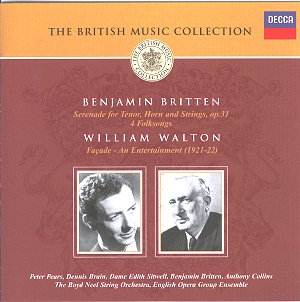Self-recommending of course. The transfers are generally
good but surprisingly the Serenade sounds a little rough and
ready. As for the performances I donít think thereís much I can add
to the encomia devoted to these recordings down the years. I would suggest
Ė and it hardly takes much suggesting Ė that these are all first choice
recordings and the coupling is apt insofar as the ambiguous relationship
between the composers allow, though the disjunction of the musical sensibility
of the works is so marked as to be almost absurd. As far as Façade
is concerned Iím disappointed that Decca have failed to identify the
personnel of the English Opera Group conducted with such nonchalant
skill by ex-violist Anthony Collins. For the record they include James
Blades, Richard Temple Savage, David Mason, Stephen Waters; the cellists
are Terence Weil and Ė no less Ė Anthony "Charlie" Pini.
Sitwell is magnificent in the idiosyncratic recitation
and Pears only slightly less so. The delivery is crisp and itís still
instructive hearing Sitwell dispatch her own lines with such unselfconscious
brio and intonational interest. The Marriner Man features Temple
Savageís fabulous bass clarinet and the following Long Steel Grass
Stephen Watersí trumpet. Collins keeps a taut rhythmic drive in
Through Gilded Tresses whilst Pears himself shines in the tongue-twisting
Tango-Pasodoble, aided by trumpet, drum and an immense swing.
And even after these years Pearsí throwaway doesnít understand at
all in A Man from a Far Countree has never been matched.
Delicious. The instrumental textures of By the Lake are well
worth studying, from the wind to cellos to the final resigned pizzicatos.
Façade isnít all about recitation and one of the most
outstanding aspects of this performance is the instrumental contribution
made by such distinguished musicians. Collins keeps a laudable control
over the increasingly hypnotic instrumentation of Four in the Morning
(prominent being the alto saxophone of, I believe, Michael Krein).
Heís certainly to the fore in a riotous Jodelling Song and Waters
returns to give a superb lift to his trumpeting in the Popular Song.
The never-matched Serenade has now spent nearly sixty
years as the recording by which others are judged. Noting the less than
perfect sound is the only blot. Itís accompanied by four folksongs recorded
between 1959-61 by Pears and Britten, two by Thomas Moore, and worth
the hearing if you donít know them. Texts of the Serenade are
provided.
Jonathan Woolf
see also review by
Hubert Culot


